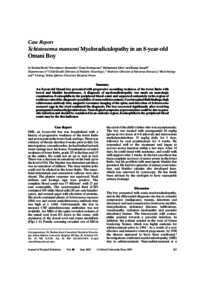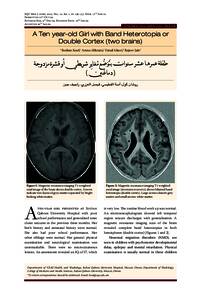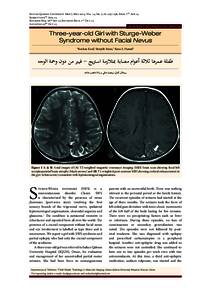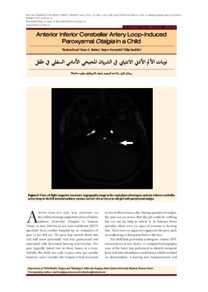Document
One in three : congenital bent bone disease and intermittent hyperthermia in three siblings with Stuve-Wiedemann syndrome.
Contributors
Al-Kindyiah, Adila., Author
Mani, Renjith., Author
Sankhla, Dilip., Author
Al-Futaisiyah, Amna., Author
Other titles
واحدة في ثلاثة : أمراض انحناء العظام الخلقية وحرارة مفرطة متقطعة في ثلاثة أشقاء مع متلازمة ستوف-ويدمان
Publisher
College of Medicine, Sultan Qaboos University.
Gregorian
2013-05
Language
English
Subject
English abstract
Stuve-Wiedemann syndrome (STWS) is a rare disorder characterised by congenital bowing of the long bones, contractures of the joints, neonatal onset of respiratory distress, sucking and swallowing difficulties, dysautonomia presenting as episodic hyperthermia, and usually an early death. Three siblings from a consanguineous marriage presented with similar clinical features over 16 years. STWS was established with their last child at the beginning of 2012. All the children exhibited the onset of STWS in the neonatal period with fever and generalised hypotonia. Examinations of all the infants revealed camptodactyly, micrognathia, bent long bones with wide metaphyses, and hypotonia. Only the second affected child had myotonia, demonstrated by electromyography. Unusual pyrexia as a presenting feature in this syndrome needs early recognition so that extensive and elaborate investigations can be avoided. The disorder is usually caused by a mutation in the leukaemia inhibitory factor receptor gene
Member of
Resource URL
Citation
Koul, Roshan, Al-Kindyiah, Mani, Renjith, Sankhla, Dilip & Al-Futaisiyah, Amna (2013). One in three : congenital bent bone disease and Intermittent Hyperthermia in Three Siblings with Stuve-Wiedemann Syndrome. Sultan Qaboos University Medical Journal, 13
Arabic abstract
الملخص: متلازمة ستوف-ویدمان اضطراب نادر يتميز بإنحناء خلقي للعظام الطويلة، تقفعات المفاصل، ضيق في التنفس منذ الولادة صعوبات في المص و البلع، اضطراب عصبي ذاتي يكون على شكل حمي مفرطة عرضية، وعادة موت مبكر. ثلاثة اشقاء ولدوا من زواج اقارب و ظهرت عليهم سمات سريرية مماثلة على مدى 16 عاما، تم تشخيص المتلازمة لدى العائلة عند ولادة اخر طفلة في بداية 2012. كان جميع الأطفال في البداية يعانون منذ الولادة من حمى مفرطة ونقص التوتر العام. کشف الفحص السريري لجميع الرضع عن انعطاف الإصبع المستديم، صغر الفك، انحناء العظام الطويلة مع كراديس واسعة، ونقص التوتر. فقط كان الطفل الثاني متضررا من التوتر العضلي من خلال رسم كهرباء العضل. الحمى المفرطة سمة غير عادية في هذه المتلازمه ويمكن أن تساعد على التعرف المبكر لهذه المتلازمة بحيث يمكن تجنب عمل فحوصات موسعة ومفصلة. هذه المتلازمة نتيجة طفرة في جين مستقبلات العامل المثبط لسرطان الدم.
Category
Journal articles







